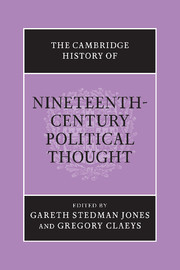Book contents
- Frontmatter
- Contents
- Contributors
- Acknowledgements
- Introduction
- I Political thought after the French Revolution
- II Modern liberty and its defenders
- 8 From Jeremy Bentham's radical philosophy to J. S. Mill's philosophic radicalism
- 9 John Stuart Mill, mid-Victorian
- 10 The ‘woman question’ and the origins of feminism
- 11 Constitutional liberalism in France
- 12 American political thought from Jeffersonian republicanism to progressivism
- 13 German liberalism in the nineteenth century
- 14 Visions of stateless society
- III Modern liberty and its critics
- IV Secularity, reform and modernity
- Biographies
- Bibliography
- Index
11 - Constitutional liberalism in France
From Benjamin Constant to Alexis de Tocqueville
from II - Modern liberty and its defenders
Published online by Cambridge University Press: 28 July 2011
- Frontmatter
- Contents
- Contributors
- Acknowledgements
- Introduction
- I Political thought after the French Revolution
- II Modern liberty and its defenders
- 8 From Jeremy Bentham's radical philosophy to J. S. Mill's philosophic radicalism
- 9 John Stuart Mill, mid-Victorian
- 10 The ‘woman question’ and the origins of feminism
- 11 Constitutional liberalism in France
- 12 American political thought from Jeffersonian republicanism to progressivism
- 13 German liberalism in the nineteenth century
- 14 Visions of stateless society
- III Modern liberty and its critics
- IV Secularity, reform and modernity
- Biographies
- Bibliography
- Index
Summary
Introduction
When Madame de Staël wrote her Considérations sur la Révolution Française one of the central questions she raised was the following: ‘Did France possess a Constitution before the Revolution?’ (de Staël 2008, pp. 96–111). Her answer was that France had been ‘governed by custom, by caprice but never by laws’ and that of all modern monarchies France had undoubtedly been the one ‘whose political institutions had been the most arbitrary’. This is a portrayal that France's monarchs might have challenged – they certainly felt themselves to be constrained in their actions by a set of fundamental laws that they might not transgress – but the fact remained that by 1789 there existed a widespread demand for a written constitution that would set out clear limits to the actions of government and that would define the rights of all citizens. It was in this context that the meaning attributed to the idea of a constitution changed irrevocably, and with radical implications. Henceforth it was to be understood as the set of arrangements that were to determine the manner in which institutions of the state and of public authority operated. Moreover, given the descent of the monarchy into what was widely perceived to be despotism, the demand was increasingly made that these arrangements should correspond to the deliberate choice of the nation.
- Type
- Chapter
- Information
- The Cambridge History of Nineteenth-Century Political Thought , pp. 349 - 373Publisher: Cambridge University PressPrint publication year: 2011
- 18
- Cited by



